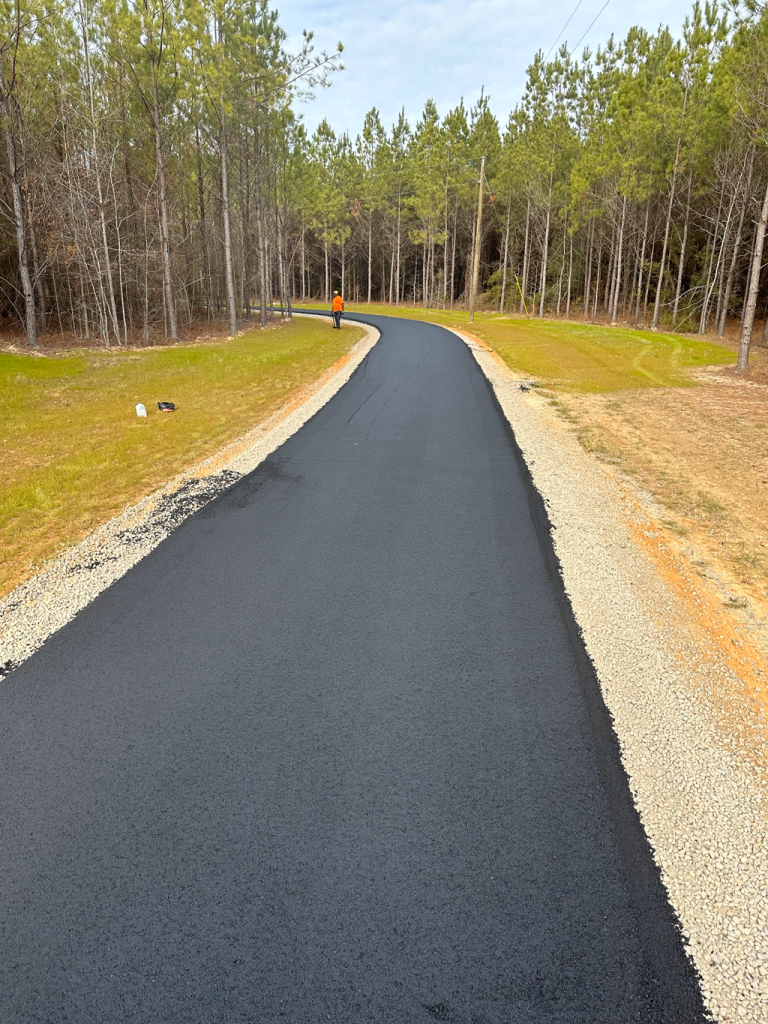Gravel or Asphalt
If you have a gravel driveway, you already know its charm—affordable, functional, and that satisfying crunch underfoot. But let’s be honest, gravel isn’t perfect for every situation. Maybe you’re tired of constant upkeep or battling ruts after heavy rains. Maybe snow removal in the winter feels like a losing battle. If any of this sounds familiar, it might be time to consider asphalt paving.
Gravel and asphalt each have their strengths. By understanding what they offer, you can make the best decision for your property without compromising on value or practicality.
Why Pave Over Gravel?
Gravel driveways are cost-effective and versatile, but they do have their limits—especially under heavy traffic or tough weather conditions. This is where asphalt really shines.
Durability You Can Rely On
Gravel can shift, compact, and even wash away over time, especially if your driveway sees a lot of use. Asphalt, on the other hand, provides a solid, smooth surface that can handle heavy loads without breaking a sweat. If you’ve ever had to regrade deep ruts left by delivery trucks or heavy equipment, you’ll understand the appeal of a surface that stays put.
Less Maintenance, More Free Time
Gravel driveways demand regular attention—filling potholes, re-spreading gravel, and pulling weeds that seem to pop up overnight. Asphalt drastically reduces your to-do list. A little cleaning and occasional sealing are all it takes to keep it looking and performing its best.
Safety First
Gravel can create uneven surfaces that are risky for kids running around, older adults walking through, or vehicles navigating in bad weather. Asphalt eliminates these hazards with a smooth, even surface.
Weatherproof and Winter-Ready
Gravel handles water well, but heavy rain or snow can leave behind messy, compacted spots—or worse, patches of gravel that have washed away. Asphalt is built to weather the storm, staying intact and usable no matter what Mother Nature throws your way. Plus, snow removal is a breeze. No more worrying about shovels or plows picking up chunks of your driveway along with the snow.
Cost-Effective in the Long Run
While gravel is often the cheaper option upfront, asphalt pays for itself over time. Fewer repairs and lower maintenance costs make it a smart choice for areas that see a lot of use or are prone to tough weather conditions.
Why Gravel Still Rocks
Gravel isn’t going anywhere—it’s affordable, functional, and full of personality. In fact, there are many situations where gravel is the better option.
• Affordable and Accessible: Gravel is one of the most budget-friendly driveway materials out there.
• Rustic Appeal: It’s hard to beat the charm of a gravel driveway, especially in rural or wooded settings.
• Environmentally Friendly: Gravel allows water to filter through, reducing runoff and erosion.
• Easily Adjustable: Need to expand your driveway? Adding more gravel is quick and easy.
Striking the Right Balance
Here’s the good news: you don’t have to choose one or the other. Many property owners find that a combination of gravel and asphalt works perfectly.
• Gravel for Low-Traffic Areas: Longer driveways, farm paths, or secondary routes can stay gravel to keep costs down.
• Asphalt for High-Use Zones: Pave areas that see the most wear and tear, like entrances, steep inclines, or spots closest to the house.
This hybrid approach gives you the best of both worlds—durability where you need it and affordability where you don’t.
Ready to Decide?
Whether you’re sticking with gravel, upgrading to asphalt, or combining the two, the key is finding what works best for your needs. Gravel driveways are practical, cost-effective, and timeless. Asphalt, on the other hand, offers durability, safety, and a polished look.
If you’re not sure which option is right for your driveway, reach out to a gravel or paving specialist. They’ll help you weigh the pros and cons based on your specific property and goals. Whatever you choose, you’ll be one step closer to a driveway that looks great and performs even better.
